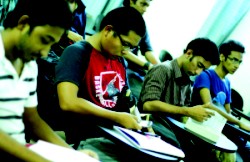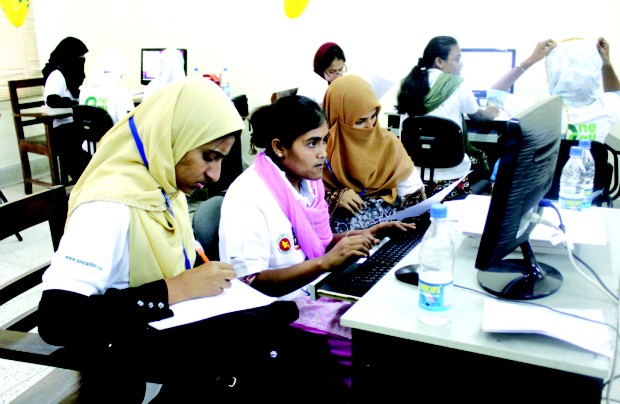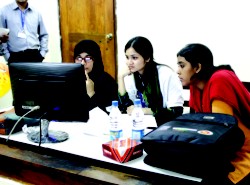| Home - Back Issues - The Team - Contact Us |
 |
| Volume 10 |Issue 24 | June 24, 2011 | |
|
|
Education Ladies, it's not your Cup of Tea! You might be smart, confident, multitasking, a quick learner, a sport at team work, you have all the qualities to improvise, you might have all the attributes of a proficient engineer; but, in the interview room, almost without any exception, you are asked, 'But you are a woman! Are you sure you can handle the pressure?' AANTAKI RAISA
With the socio-economic development of the country, the engineering sectors and the research and development (R&D) sector are improving with time. More industries related to science and engineering, such as telecom industries- operators and vendors, pharmaceutical farms, software firms, architecture firms, energy corporations etc are growing their businesses rapidly in Bangladesh. Consequently, more students are studying science and engineering, the number of graduates in science and technology is increasing as well and more people are looking for jobs in this sector. Though the scenario is changing positively in many ways in the engineering and science-oriented industries, it is not as encouraging for women. “I have worked in all three major telecom vendors- Ericsson, Nokia Siemens Network and Huawei in the last six years,” says Imtiaz (not his real name) “and I never saw more than five women working in the technical sector in any of those companies.” Priota, a graduate in Computer Science and Engineering firm MIST (Military Institute of Science and Technology) mentions, “When I joined a software farm right after graduating, the work environment seemed really hostile to me.” “Initially I was the only woman working as a computer engineer and the second woman joined after half a year of my employment,” she adds. Tazneen, a chemical engineer from BUET (Bangladesh University of Engineering and Technology) left her job at an established foreign energy corporation in Bangladesh. She complains, “The office was in Sylhet and I was the only woman working in the department I was assigned to.” She continues, “The male colleagues weren't very friendly and I didn't feel secure at all!” The abnormally high male to female ratio in the technical industry is quite apparent in Bangladesh and “it probably starts from the university classrooms,” opines a public relations officer at Grameen Phone, preferring anonymity. “Go to a classroom in BUET or in the Pharmacy department of Dhaka University, you'll know what I'm saying,” he continues, “for every 10 male students there would be one female student. Girls tend to take engineering or applied or pure sciences as undergrad subjects less than boys do,” he adds, “hence there are less female applicants than male applicants for vacant posts in these sectors.” There are myriad reasons why women do not take engineering or science-related subjects as men do. Uma, now married and mother of a six-year-old says, “My parents married me off when I just got into the Department of Civil Engineering in BUET.” “But, engineering is not a very easy subject. Being married and having to take care of a family made it impossible for me to continue my studies,” she adds, “I finally dropped out and took Dramatics in Jahangirnagar University, as it seemed more convenient for me and my new family.” Zakia's parents didn't let her study in Genetic Engineering in University of Dhaka, despite the fact that she got a chance to. “My elder daughter studied Architecture at BUET,” explains Zakia's mother, “I saw how hard she had to work; she had to stay out late and go on field trips frequently. I hardly saw her in the house.” Zakia's mother didn't want the same for Zakia, so she forced her to study BBA at a private university. A lot of parents also think that it's hard to find a groom for an over-qualified daughter. As most of the time, science or engineering graduates tend to pursue a Master or be career -oriented, it might harm their future lives as wives or mothers. As the girls grow up with these stereotypes they themselves don't feel confident enough to pursue higher studies in science and engineering. Savita, an International Relations (IR) student at the University of Dhaka says, “My uncles always used to tell me girls are bad at math. Whenever I got poor marks in math in school, I used to think it's because I am a girl.” Out of fear of failure Savita didn't even take science in higher secondary school and ended up studying in IR. “But I loved and still love physics. I found physics very easy, including the math problems it contained,” adds Savita who feels if she had the support from her family she would have had the confidence to pursue higher studies in physics.
But it's not just the small number of female graduates that makes the male to female ratio in the science and engineering industry high. Last year, the top two students from the Department of Chemistry in BUET were females; in the14th convocation of the North South University six out of the top ten students from the Department of Electrical, Electronics and Computer Science were females and these statistics are no exceptions; they are followed by similar statistics from other science and technology departments of other universities and in other years as well. Sabrina and Faiyaz, both graduated from Electronics and Telecommunication Engineering from the North South University. They both applied to a popular telecom vendor company. Faiyaz got selected, Sabrina didn't. They both were perplexed with the incident as Sabrina was far more qualified than Faiyaz was- in terms of confidence, smartness, knowledge and skills. A few months later, Faiyaz told Sabrina that as the job role requires a lot of field work, the authorities preferred male employees over females; it had nothing to do with qualifications or whatsoever- and Faiyaz received this piece of information from a senior employee at the vendor company. “Most of our technical jobs require the assigned officer to go to remote places,” says a project manager of a telecom vendor company who preferred anonymity of his company and of himself, “at the middle of the night and work for days in a row.” He mentions that due to the social structure of Bangladesh, this kind of job risks the security of women. “Most women wouldn't even want to do the job,” he adds, “even if someone did, the company wouldn't want to risk its reputation over her security.” And security is not the only hurdle. These jobs are all about team work and the teams consist of men who have diplomas in technical subjects and are not very well-educated. It becomes very tough even for a man to make them do their job properly; “Just imagine how hard it would be for a woman!” says the project manager, “Our men swear, abuse and even threaten those diploma-holders; I don't think a woman could do that!” This project manager, who always recruits male applicants for his assigned projects, blames it on the social structure, the tasks and the internal system of the industry which make it next to impossible for women to survive, let alone succeed.
Ayesha, a CSE graduate from the Ahsanullah University, once saw an advertisement on the bdjobs.com where a multinational company asked for 'male IT officers'. She immediately complained against the circular to the head office in Singapore as it went against the company's gender policy which promises to provide equal opportunities to men and women. The local branch, in reaction to her complaint, edited the advertisement and addressed to both male and female applicants. “I got through the written examination but they were ready for me in the interview,” says Ayesha, now employed at the IT section of a multinational bank, “They kept obsessing over whether I could work nights or would I choose my work over family and a lot of other personal and irrelevant questions.” She mentions that, they did the same to all other female applicants but the job did not really require frequent over-night stays. Although Ayesha said that she could and would do everything to get her job done in time, all the applicants who got employed were males. “Not a single female applicant got selected; they just made this mock interview so that no one could accuse them of violating the gender policy,” complains Ayesha. A Human Resource (HR) officer at the Bangladesh Machine Tools Factory (BMTF) mentions that men are better with machines: “As they play with toy cars and robots since childhood, they are sort of inherently good at operating different kind of machines.” He also thinks that women lack the physical strength required to control some heavy machines. “And from an employer's perspective, it's more convenient to hire a man for engineering tasks,” he adds, “Women come with a lot of baggage- security issues, transportation issues, pregnancy and what not!” He thinks that as engineering jobs and science-related projects need continuity, the extra complications brought by a woman employee is naturally not welcomed here. Women are not comfortable with the working environment in this sector either. Rabeya (not her real name) works as a research assistant in the pharmacy department of the University of Dhaka. She is working in a research group consisting of three men and her. “My research partners are not very sincere at their work; I have to do most of the stuff-programming, recording results, sampling and etc,” she complains, “I never whine to my professor about my group members but unfortunately they take advantage of that.” She mentions that, her professor thinks that she has no contribution to the work and her group mates never appreciates or acknowledges her contributions. “My professor thinks it's the men who can programme well, analyse well and that's why he gives credit to the male members of the group, disregarding my performance,” she adds. Despite all the obstacles, there are women who are working their way through. Women are excelling as lecturers and professors at the science and technology departments of renowned universities, they are doing great at the jobs they are offered like monitoring and maintenance at many mobile operators and vendor companies, their contribution as researchers and technicians is well appreciated and acknowledged at many pharmaceutical companies. A lot of companies are realising the importance of a proper male to female ratio in a working environment and hence are hiring more women for technical jobs. With developing technology, machines are becoming much easier to handle and less complicated to control. Forty eight years ago, Valentina Tereshkova operated a space shuttle that was primarily made for men, containing heavy machinery and complicated mechanism. It was her spirit and devotion that led her to victory. Our female pharmacists, physicists, chemists and engineers have the skills, spirit and devotion. All they need is a female-friendly society and a supportive working environment.
Copyright
(R) thedailystar.net 2011 |
||||


